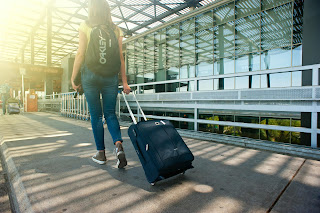THE ULTIMATE TRAVEL THE WORLD GUIDE
Discover essential tips and best practices for planning, packing, and enjoying your global adventure in The Ultimate Travel the World Guide.
Outline
1. Introduction
- Importance of Travel
- Personal Growth through Travel
- Overview of Topics
2. Planning Your Trip
- Research Destinations
- Budgeting
- Travel Insurance
- Booking Flights and Accommodation
- Itinerary Planning
- Health Precautions
3. Packing Essentials
- Packing Light
- Travel Gear
- Documents and Money
- Health and Safety Items
4. Cultural Sensitivity and Etiquette
- Research Local Customs
- Learning Basic Phrases
- Dress Code
- Respecting Local Traditions
5. Safety Tips
- Personal Safety
- Health Safety
- Scams and Fraud Prevention
- Emergency Contacts
6. Transportation
- Air Travel
- Public Transport
- Car Rentals
- Biking and Walking
7. Sustainable and Responsible Travel
- Eco-Friendly Practices
- Supporting Local Economies
- Ethical Wildlife Tourism
- Reducing Carbon Footprint
8. Digital Nomadism
- Working Remotely
- Balancing Work and Travel
- Essential Tools and Apps
- Co-working Spaces
9. Socializing and Meeting New People
- Staying in Hostels
- Joining Local Tours and Events
- Online Communities and Forums
- Volunteering Opportunities
10. Food and Drink
- Trying Local Cuisine
- Street Food Safety
- Dietary Restrictions
- Cooking Your Own Meals
11. Documenting Your Journey
- Photography Tips
- Blogging and Vlogging
- Social Media Sharing
- Keeping a Travel Journal
12. Handling Challenges
- Dealing with Culture Shock
- Coping with Homesickness
- Problem Solving on the Road
- Staying Positive and Adaptable
13. Returning Home
- Managing Finances
- Reflecting on Your Experience
- Staying Connected with New Friends
- Planning Future Travels
14. Conclusion
- Recap of Best Practices
- Encouragement to Start Your Own Journey
- Final Thoughts
Introduction
Traveling the world is more than just visiting new places; it’s about embracing new cultures, broadening your perspectives, and experiencing life in ways you never imagined. Whether you are a seasoned traveler or a novice, knowing the best practices can make your journey smoother and more enriching. This blog post will provide you with essential tips and guidelines to help you travel the world efficiently and responsibly.
Planning Your Trip
Before embarking on your journey, thorough planning is crucial. Start by researching potential destinations. Consider factors such as climate, visa requirements, and the political situation of the countries you plan to visit. Websites like Lonely Planet and TripAdvisor are excellent resources for gathering information.
Budgeting is a significant part of travel planning. Estimate your expenses, including flights, accommodation, food, transportation, and activities. Utilize budgeting apps to keep track of your spending. Always have a contingency fund for emergencies.
Travel insurance is non-negotiable. It covers unforeseen events such as medical emergencies, trip cancellations, and lost luggage. Compare different insurance plans to find one that suits your needs.
When booking flights and accommodation, use comparison websites like Skyscanner and Booking.com to get the best deals. Consider alternative accommodations like hostels, Airbnb, or even house-sitting for a more immersive experience.
Create a flexible itinerary. While it’s good to have a plan, be open to spontaneous adventures. Balance your schedule with enough downtime to relax and explore.
Health precautions are essential, especially when traveling to countries with different climates and health risks. Visit a travel clinic to get necessary vaccinations and medications. Carry a first aid kit and familiarize yourself with local healthcare facilities.
Packing Essentials
Packing efficiently can significantly enhance your travel experience. The key is to pack light. Choose versatile clothing that can be layered and mix-and-matched. Use packing cubes to organize your belongings and a good-quality backpack or suitcase.
Essential travel gear includes a universal adapter, portable charger, reusable water bottle, and a sturdy lock for your luggage. For tech-savvy travelers, a lightweight laptop or tablet can be useful.
Keep your documents and money secure. Use a money belt or a hidden pouch for your passport, credit cards, and cash. Make digital copies of important documents and store them in a secure cloud service.
Health and safety items are crucial. Pack any prescription medications, hand sanitizer, face masks, and a small medical kit with essentials like band-aids, antiseptic wipes, and pain relievers.
Cultural Sensitivity and Etiquette
Being respectful of local cultures is paramount. Research the customs and traditions of the places you visit. Understand what is considered polite and what is offensive.
Learning basic phrases in the local language can go a long way in showing respect and making connections. Phrases like “hello,” “thank you,” and “excuse me” are often appreciated.
Dress appropriately according to local customs. In some cultures, modest clothing is required, especially when visiting religious sites. It’s always better to err on the side of caution.
Respect local traditions and practices. Participate in cultural events and festivals but always do so respectfully. Avoid behaviors that might be considered disrespectful or intrusive.
Safety Tips
Safety should always be a priority. Stay aware of your surroundings, especially in crowded places. Keep your valuables secure and avoid displaying expensive items.
Health safety is equally important. Drink bottled or purified water, and be cautious with street food. Know the emergency numbers for the countries you are visiting and the location of the nearest embassy or consulate.
Be aware of common scams and fraud tactics targeting tourists. Research beforehand and stay vigilant. Trust your instincts and avoid situations that feel uncomfortable.
Always have emergency contacts readily available. This includes family members, friends, and local contacts. Keep a list of important numbers in case your phone is lost or stolen.
Transportation
Getting around in a new country can be challenging but also exciting. Air travel is often the fastest way to cover long distances. Book flights in advance and look for deals.
Public transport, like buses and trains, is usually cost-effective and a great way to experience local life. Research routes and schedules in advance.
Car rentals can offer flexibility but come with their own set of challenges, like navigating unfamiliar roads and understanding local driving laws. Make sure to have an international driving permit if required.
Biking and walking are eco-friendly options that allow you to explore places at your own pace. Many cities have bike-sharing programs and pedestrian-friendly areas.
Sustainable and Responsible Travel
Sustainable travel is about making choices that benefit the environment and local communities. Reduce your carbon footprint by choosing direct flights, using public transport, and minimizing waste.
Support local economies by staying in locally-owned accommodations, eating at local restaurants, and buying souvenirs from local artisans.
Engage in ethical wildlife tourism. Avoid attractions that exploit animals and choose responsible tour operators. Participate in conservation projects if possible.
Reduce your environmental impact by carrying reusable items like water bottles, shopping bags, and utensils. Avoid single-use plastics and be mindful of your waste.
Digital Nomadism
For those who work remotely while traveling, finding a balance is key. Establish a routine that allows you to be productive while enjoying your surroundings.
Use essential tools and apps for remote work. Reliable internet is crucial, so research the connectivity options of your destination. Consider co-working spaces for a conducive work environment.
Stay organized with apps for project management, communication, and time tracking. Tools like Slack, Trello, and Zoom can help you stay connected with your team.
Socializing and Meeting New People
Meeting new people is one of the joys of travel. Staying in hostels is a great way to meet fellow travelers. Many hostels organize social events and tours.
Join local tours and events to connect with both locals and travelers. Websites like Meetup and Couchsurfing offer opportunities to join activities and meet people with similar interests.
Online communities and forums can provide valuable advice and connections. Platforms like Reddit, Lonely Planet’s Thorn Tree, and Facebook groups are good places to start.
Volunteering is another way to meet people and give back to the community. Look for opportunities that match your skills and interests.
Food and Drink
Exploring local cuisine is a highlight of traveling. Try regional dishes and street food but be cautious with hygiene. Choose busy vendors with high turnover to ensure freshness.
If you have dietary restrictions, research the local cuisine in advance and learn how to communicate your needs in the local language. Many apps can help with translations and finding suitable restaurants.
Cooking your own meals can be a fun and cost-effective way to eat healthily. Visit local markets to buy fresh ingredients and try your hand at local recipes.
Documenting Your Journey
Documenting your travels can enhance your experience and create lasting memories. Photography tips include carrying a lightweight camera, understanding basic composition, and being mindful of lighting.
Blogging and vlogging are great ways to share your experiences. Consistency is key, so create a schedule that works for you. Use platforms like WordPress, YouTube, and social media to reach a wider audience.
Social media sharing can keep your friends and family updated. Use hashtags to connect with other travelers and discover new places.
Keeping a travel journal is a personal way to document your thoughts and experiences. It can be a valuable keepsake to look back on in the future.
Handling Challenges
Traveling is not without its challenges. Dealing with culture shock can be tough, but staying open-minded and positive helps. Engage with locals and learn about their way of life.
Homesickness is a natural part of long-term travel. Missing familiar surroundings and loved ones can be tough, but there are ways to cope:
Stay Connected: Regularly communicate with family and friends through calls, messages
Returning Home
After the adventure of traveling the world, returning home can be a mix of emotions. It’s important to manage this transition smoothly to preserve the positive impacts of your journey and integrate your experiences into your everyday life.
Managing Finances
Managing your finances upon returning home is crucial to ensuring a stable transition back to your routine. Here are some steps to consider:
- Review Your Budget: Go through your travel expenses and compare them with your initial budget. Identify any areas where you overspent and understand why that happened. This can help you plan better for future trips.
- Settle Outstanding Payments: Pay off any credit card balances or loans taken for the trip. Keeping your financial health in check is important to avoid long-term debt.
- Save for the Future: Start setting aside funds for your next trip. Open a separate savings account dedicated to travel and contribute to it regularly.
- Evaluate Insurance Claims: If you had any travel-related incidents, such as lost luggage or medical expenses, ensure you file any necessary insurance claims promptly.
Reflecting on Your Experience
Reflecting on your travel experiences helps to cement the memories and learn from them:
- Journal Your Thoughts: Spend time writing about your journey, the places you visited, the people you met, and the lessons learned. This helps to process your experiences and retain the details.
- Create a Photo Album or Scrapbook: Organize your photos and memorabilia into an album or digital scrapbook. This not only serves as a beautiful keepsake but also as a tangible reminder of your adventures.
- Share Your Stories: Share your travel stories with friends, family, or through social media. Blogging or vlogging can be a great way to keep a record and inspire others.
Staying Connected with New Friends
One of the most rewarding aspects of traveling is the people you meet along the way. Maintaining these connections can enrich your life:
- Social Media: Connect with new friends on social media platforms. This allows you to stay updated on each other’s lives and maintain a connection.
- Regular Communication: Make an effort to communicate regularly, whether through messages, emails, or video calls. Shared memories and experiences can strengthen your bond.
- Reunions: Plan future trips or reunions with the friends you made. Meeting up in different parts of the world can continue the spirit of adventure and friendship.
Planning Future Travels
The end of one journey often sparks the desire for another. Here’s how to keep the travel bug alive:
- List New Destinations: Create a list of places you want to visit next. Research these destinations to build excitement and gather information for future trips.
- Learn from Past Trips: Reflect on what worked and what didn’t during your recent travels. Use these insights to plan better for your next adventure.
- Stay Inspired: Follow travel blogs, watch documentaries, and read books about travel to keep your wanderlust alive. Staying inspired helps in maintaining the enthusiasm for future journeys.
Conclusion
Recap of Best Practices
To wrap up, here are the best practices for traveling the world:
- Plan Thoroughly: Research destinations, create a budget, and make detailed travel plans, but remain flexible for spontaneous adventures.
- Pack Smart: Pack light and carry essential travel gear, documents, and health items.
- Be Culturally Sensitive: Respect local customs, learn basic phrases, and adhere to dress codes.
- Stay Safe: Prioritize personal and health safety, be aware of common scams, and keep emergency contacts handy.
- Travel Responsibly: Practice sustainable travel, support local economies, and engage in ethical tourism.
- Document Your Journey: Keep a travel journal, take photos, and share your experiences through blogging or social media.
- Embrace Challenges: Stay positive and adaptable when facing travel challenges, and use them as learning experiences.
- Reflect and Plan Ahead: Reflect on your experiences, stay connected with new friends, and plan future travels.
Encouragement to Start Your Own Journey
Embarking on a journey around the world is a decision you won't regret. The experiences you gain, the people you meet, and the memories you create will be invaluable. Remember, travel is not just about the destination, but the journey itself. Every step you take and every challenge you overcome will contribute to your personal growth and broaden your perspective.
Final Thoughts
Traveling the world is one of the most enriching experiences you can have. It teaches you to be resilient, open-minded, and appreciative of the diversity that exists in the world. As you plan and embark on your journey, keep these best practices in mind to make the most of your travels. Embrace the unknown, savor every moment, and let your adventures shape the person you become. Safe travels!











Comments